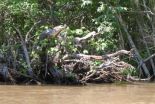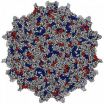(Press-News.org) When most people envision crocodiles, they think of them waddling on the ground or wading in water—not climbing trees. However, a University of Tennessee, Knoxville, study has found that the reptiles can climb trees as far as the crowns.
Vladimir Dinets, a research assistant professor in the Department of Psychology, is the first to thoroughly study the tree-climbing and -basking behavior. The research is published in the journal Herpetology Notes and can be found at http://bit.ly/Myi8yr.
Dinets and his colleagues observed crocodile species on three continents—Australia, Africa and North America—and examined previous studies and anecdotal observations. They found that four species climbed trees—usually above water—but how far they ventured upward and outward varied by their sizes. The smaller crocodiles were able to climb higher and further than the larger ones. Some species were observed climbing as far as four meters high in a tree and five meters down a branch.
"Climbing a steep hill or steep branch is mechanically similar, assuming the branch is wide enough to walk on," the authors wrote. "Still, the ability to climb vertically is a measure of crocodiles' spectacular agility on land."
The crocodiles seen climbing trees, whether at night or during the day, were skittish of being recognized, jumping or falling into the water when an approaching observer was as far as 10 meters away. This response led the researchers to believe that the tree climbing and basking are driven by two conditions: thermoregulation and surveillance of habitat.
"The most frequent observations of tree-basking were in areas where there were few places to bask on the ground, implying that the individuals needed alternatives for regulating their body temperature," the authors wrote. "Likewise, their wary nature suggests that climbing leads to improved site surveillance of potential threats and prey."
The data suggests that at least some crocodile species are able to climb trees despite lacking any obvious morphological adaptations to do so.
"These results should be taken into account by paleontologists who look at changes in fossils to shed light on behavior," said Dinets. "This is especially true for those studying extinct crocodiles or other Archosaurian taxa."
INFORMATION:
Dinets collaborated with Adam Britton from Charles Darwin University in Australia and Matthew Shirley from the University of Florida.
Research by Dinets published in 2013 found another surprising crocodile characteristic—the use of lures such as sticks to hunt prey. More of his crocodile research can be found in his book "Dragon Songs."
University of Tennessee study finds crocodiles climb trees
Vladimir Dinets, a research assistant professor in the Department of Psychology, is the first to thoroughly study the tree-climbing and -basking behavior
2014-02-11
ELSE PRESS RELEASES FROM THIS DATE:
Caltech-developed method for delivering HIV-fighting antibodies proven even more promising
2014-02-11
In 2011, biologists at the California Institute of Technology (Caltech) demonstrated a highly effective method for delivering HIV-fighting antibodies to mice—a treatment that protected the mice from infection by a laboratory strain of HIV delivered intravenously. Now the researchers, led by Nobel Laureate David Baltimore, have shown that the same procedure is just as effective against a strain of HIV found in the real world, even when transmitted across mucosal surfaces.
The findings, which appear in the February 9 advance online publication of the journal Nature Medicine, ...
The content of our cooperation, not the color of our skin
2014-02-11
It's widely acknowledged that a common threat unites people. Individuals who were previously separated by social class, race or ethnicity come together, forming new cooperative alliances to defeat a common enemy. But does it take an external threat — an attack like Pearl Harbor or 9/11 — to make these social divisions melt away?
A study by behavioral scientists at UC Santa Barbara demonstrates that peaceful cooperation has the same effect as intergroup conflict in erasing social boundaries connected to race. Their findings appear today in the journal PLOS ONE.
"Evolution ...
Fish living near the equator will not thrive in the warmer oceans of the future
2014-02-11
According to an international team of researchers, the rapid pace of climate change is threatening the future presence of fish near the equator.
"Our studies found that one species of fish could not even survive in water just three degrees Celsius warmer than what it lives in now," says the lead author of the study, Dr Jodie Rummer from the ARC Centre of Excellence for Coral Reef Studies (Coral CoE) at James Cook University.
Dr Rummer and her colleagues studied six common species of fish living on coral reefs near the equator. She says many species in this region only ...
How our brain networks: Research reveals white matter 'scaffold' of human brain
2014-02-11
For the first time, neuroscientists have systematically identified the white matter "scaffold" of the human brain, the critical communications network that supports brain function.
Their work, published Feb. 11 in the open-source journal Frontiers in Human Neuroscience, has major implications for understanding brain injury and disease. By detailing the connections that have the greatest influence over all other connections, the researchers offer not only a landmark first map of core white matter pathways, but also show which connections may be most vulnerable to damage.
"We ...
Scientists identify gene linking brain structure to intelligence
2014-02-11
For the first time, scientists at King's College London have identified a gene linking the thickness of the grey matter in the brain to intelligence. The study is published today in Molecular Psychiatry and may help scientists understand biological mechanisms behind some forms of intellectual impairment.
The researchers looked at the cerebral cortex, the outermost layer of the human brain. It is known as 'grey matter' and plays a key role in memory, attention, perceptual awareness, thought, language and consciousness. Previous studies have shown that the thickness of ...
New research sheds light on how the body regulates fundamental neuro-hormone
2014-02-11
New research has revealed a previously unknown mechanism in the body which regulates a hormone that is crucial for motivation, stress responses and control of blood pressure, pain and appetite. The breakthrough could be used to design drugs to help fight health problems connected with these functions in the future.
Researchers at the University of Bristol and University College London found that lactate – essentially lactic acid – causes cells in the brain to release more noradrenaline (norepinephrine in US English), a hormone and neurotransmitter which is fundamental ...
Researchers discover 'epic' new Burgess Shale site in Canada's Kootenay National Park
2014-02-11
February 11, 2014 Kootenay National Park, British Columbia -- Yoho National Park's 505-million-year-old Burgess Shale – home to some of the planet's earliest animals, including a very primitive human relative – is one of the world's most important fossil sites. Now, more than a century after its discovery, a compelling sequel has been unearthed: 42 kilometres away in Kootenay National Park, a new Burgess Shale fossil site has been located that appears to equal the importance of the original discovery, and may one day even surpass it.
The find was made in the summer of ...
Minority political candidates just need a chance
2014-02-11
EAST LANSING, Mich. — It's not necessarily voters who should be blamed for the lack of minorities in state legislatures, but instead the two major political parties for not recruiting enough candidates, indicates new research by a Michigan State University scholar.
Eric Gonzalez Juenke analyzed nearly 10,000 statehouse elections in 2000 and 2010 and found Latino candidates were on the ballot just 5 percent of the time. But when Latinos did run for office, they won just as often as their white counterparts – even in districts where most voters were white.
Juenke's other ...
Biodiversity in production forests can be improved without large costs
2014-02-11
Forest management is based on recommendations that are supposed to maximize economic revenues. However, in 40% of cases a better economic result would be achieved by neglecting some of the recommendations. This would also greatly benefit biodiversity.
These results were obtained by a research group lead by Professor Mikko Mönkkönen at the University Jyväskylä. The group studied a production forest landscape encompassing 68 square kilometers of land and more than 30,000 forest stands in Central Finland.
The research project aimed at revealing the potential of a forest ...
Even moderate weight loss can prevent and cure obstructive sleep apnoea
2014-02-11
Even a moderate weight reduction can prevent the progression of obstructive sleep apnoea (OSA), and even cure it, according to a 4-year Finish follow-up study published recently in Sleep Medicine. The study focused on the effects of weight loss on OSA and demonstrated, for the first time, that a sustained weight loss of just 5% was enough to prevent the disease from worsening and even cure it in a long-term follow-up.
Obstructive sleep apnoea (OSA) has become a major burden for our health care systems over the last years. Although it is one of the most increasingly prevalent ...
LAST 30 PRESS RELEASES:
A promising potential therapeutic strategy for Rett syndrome
How time changes impact public sentiment in the U.S.
Analysis of charred food in pot reveals that prehistoric Europeans had surprisingly complex cuisines
As a whole, LGB+ workers in the NHS do not experience pay gaps compared to their heterosexual colleagues
How cocaine rewires the brain to drive relapse
Mosquito monitoring through sound - implications for AI species recognition
UCLA researchers engineer CAR-T cells to target hard-to-treat solid tumors
New study reveals asynchronous land–ocean responses to ancient ocean anoxia
Ctenophore research points to earlier origins of brain-like structures
Tibet ASγ experiment sheds new light on cosmic rays acceleration and propagation in Milky Way
AI-based liquid biopsy may detect liver fibrosis, cirrhosis and chronic disease signals
Hope for Rett syndrome: New research may unlock treatment pathway for rare disorder with no cure
How some skills become second nature
SFU study sheds light on clotting risks for female astronauts
UC Irvine chemists shed light on how age-related cataracts may begin
Machine learning reveals Raman signatures of liquid-like ion conduction in solid electrolytes
Children’s Hospital of Philadelphia researchers emphasize benefits and risks of generative AI at different stages of childhood development
Why conversation is more like a dance than an exchange of words
With Evo 2, AI can model and design the genetic code for all domains of life
Discovery of why only some early tumors survive could help catch and treat cancer at very earliest stages
Study reveals how gut bacteria and diet can reprogram fat to burn more energy
Mayo Clinic researchers link Parkinson's-related protein to faster Alzheimer's progression in women
Trends in metabolic and bariatric surgery use during the GLP-1 receptor agonist era
Loneliness, anxiety symptoms, depressive symptoms, and suicidal ideation in the all of us dataset
A decision-support system to personalize antidepressant treatment in major depressive disorder
Thunderstorms don’t just appear out of thin air - scientists' key finding to improve forecasting
Automated CT scan analysis could fast-track clinical assessments
New UNC Charlotte study reveals how just three molecules can launch gene-silencing condensates, organizing the epigenome and controlling stem cell differentiation
Oldest known bony fish fossils uncover early vertebrate evolution
High‑performance all‑solid‑state magnesium-air rechargeable battery enabled by metal-free nanoporous graphene
[Press-News.org] University of Tennessee study finds crocodiles climb treesVladimir Dinets, a research assistant professor in the Department of Psychology, is the first to thoroughly study the tree-climbing and -basking behavior




